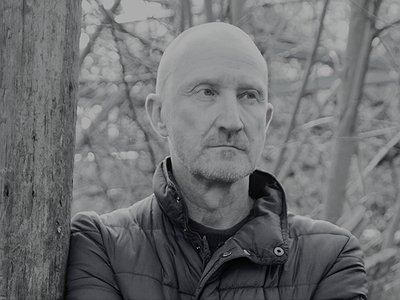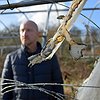Part 1
Name: Roman Bezdyk (AKA Sone Institute)
Nationality: British
Occupation: Musician
Current Release: After the Glitter Before the Decay on Mystery Bridge Records
Recommendations: Demian by Hermann Hesse / Heathen Earth by Throbbing Gristle
If you enjoyed this interview with the Sone Institute visit his website www.soneinstitute.co.uk for news about new music.
When did you start writing/producing music - and what or who were your early passions and influences? What was it about music and/or sound that drew you to it?
As a child, I was fascinated by the world of sound. Just seeing a record player operating, a needle floating on a piece of vinyl and generating sound was a totally magical experience for me. Then to be able to capture and record sounds on to a cassette tape was like entering into a different world. I used to record sounds on a microphone, people talking, noises, just random stuff. Then when I would listen back to it and it became this whole different thing. When I was 15, I bought an Akai 400DS reel-to-reel tape recorder second-hand for £75.00. I got that as I remember reading that Cabaret Voltaire used one. So, getting that was like the holy grail to me! Then I somehow through a friend of a friend ended up getting loaned a Korg mono synth of some sorts that I had for over a year. It all really started from there. Recording and bouncing tracks, making tape loops, manipulating sounds, and mixing in voices off the radio. It was the sense of there being no rules to follow that really drew me in.
For most artists, originality is preceded by a phase of learning and, often, emulating others. What was this like for you: How would you describe your own development as an artist and the transition towards your own voice?
I was never interested in learning to play someone else’s music, that seemed to defeat the whole point of being creative. When I first started making my own music, I was so adamant of not wanting to copy or be swayed by others that I would avoid anything that felt even vaguely familiar or that had a sense of melody or regular structure. But what I was making needed to have some kind of spark that interested me. This was also to do with the fact that I had no formal musical skills nor wished to go down that route. So, I was making these drone based, pulsing sound collages that had more to do with bands like Cabaret Voltaire, TG and Severed Heads.
I found that by doing things the longer, harder way round and making lots of ‘mistakes’ and a ‘mess’ I eventually hit upon by own ways of learning and working that suited me. I have never been big on shortcuts as you don’t know what you will miss on the journey itself. I made lots of tapes that I would rarely play to anyone else but which kept me fascinated. This seemed to go on for years. It was only later when I began to release music on the Front and Follow label that I realised what a rich musical heritage I had from all the years of listening, seeing gigs and absorbing music. Learning in these early stages was more about finding out what really didn’t work for me like playing in bands or working with most other people I had met. I feel much more open now to referencing sources of music which have inspired and meant a lot to me, as they no longer feel on the surface but much more absorbed in me as time has passed. In this way, I hope it becomes something else, something different than emulating others.
How do you feel your sense of identity influences your creativity?
The less of a sense of ‘identity’ I feel about myself, the clearer the creative process becomes the task at hand. It’s then more of a journey to be undertaken with a sense of adventure. Stepping out of the way is important, whilst being aware that I am very much part of the process of co-creation. This feels a more fluid way of being and doing.
What were your main creative challenges in the beginning and how have they changed over time?
My lack of any conventional musical ability or interest in that area pushed me into ways of exploring lesser trodden paths, which may not have been the case for someone who was more proficient on a particular instrument. So, I started with magnetic tape as my first compositional tool. This offered me a real sense of freedom and exploration. When I started and in the early years many things such as samplers where way out of my price range so these limitations themselves became ways of investigating and trying a more DIY approach. I still work well with restrictions and self-imposed parameters. Having too many choices I find distracting. Each time I work on and complete a project I find I have learnt something new which gets assimilated and then becomes an entry point for the next thing I do.
As creative goals and technical abilities change, so does the need for different tools of expression, be it instruments, software tools or recording equipment. Can you describe this path for you, starting from your first studio/first instrument? What motivated some of the choices you made in terms of instruments/tools/equipment over the years?
The ability to manipulate sound has always been of primary interest for me. So, recording, sampling, and the use of FX’s became a way of making and investigating sound and music. My motivation for choosing equipment has always been about simplicity of use with the potential for misuse in some interesting way. Also, financial restrictions were and are a factor. I have recently become interested in the sound of the guitar again. But from a purely sonic perspective. Using different tunings and ways of playing in a non-conventional manner it then becomes another source of sound just like with electronic equipment, there is no standard way of using it.
I have always had some kind of basic studio set -up that has allowed me to create and make recordings. I really like cheap guitar foot pedals. If they do one thing well then, a whole bunch of them together in different combinations often has some interesting and unusual results. Being surprised by the gift of chance and having a sense of wonder are key for keeping the spirit of creative enthusiasm alive. Choices are often motivated by equipment that looks like it would fit this order. If after a while it’s not the case then I sell it. It takes time for me to feel comfortable with software. It needs to feel unobtrusive to my working methods but I do like it for the very opposite reason that it’s not a piece of physical equipment. It takes up no space and that has its positives! A mix of the two works well for me. I like to set equipment up and record some parts and then they go into the computer for further alterations and editing. For me, FX and processing are very much part of the sound and not an add on.
Have there been technologies or instruments which have profoundly changed or even questioned the way you make music?
Sampling, sequencing, recording and editing audio are all technologies that I use every time I make a piece of music. I view the way I work as making a sound collage. To have tools to make a piece of music as abstract or as fully formed and coherent as I wish allows me to be able to adjust, step back, listen and observe during the process of creation. These are options offered by such technology. Having a laptop as a contained recording studio gives me a lot of freedom in not feeling enslaved to having a studio to maintain. When I had a bigger studio set up, it felt like I was spending a fair amount of time getting things working and sorting out technical issues. Less does feel like more right now. As I mentioned, I do like cheap guitar foot pedals, radios, microphones as a source of bringing in the unexpected. All these enable me to improvise ideas on my own. Then the arranging and editing is a separate process where I use software like Cubase to edit and consolidate my ideas.
Collaborations can take on many forms. What role do they play in your approach and what are your preferred ways of engaging with other creatives through, for example, file sharing, jamming or just talking about ideas?
I have file shared and had some success with that approach. That has more to do with the spirit in which the collaboration is undertaken and contributes to the success of working this way. On my second album ‘A model life’ I had at least a dozen people contribute all sorts of instruments such as brass, strings, woodwind, guitars, drums, and vocals. What I enjoyed about this process was that it was done face to face mostly. I was working in a theatre at the time so I had a great space to use for recording. I would talk with the person about what I had in mind, not in musical language but in playful metaphors and abstract ideas as a way of suggesting what I was imagining. Nearly always something spontaneous, interesting and of good use would emerge. I find talking about ideas helps me consolidate my thinking. It needs to be with someone who I trust and can just listen and get it. Making notes when ideas pop into my mind to try out is also useful as a way of engaging with my own thinking.






